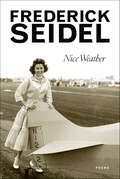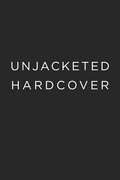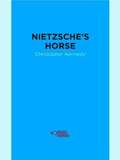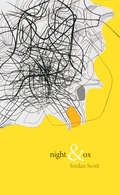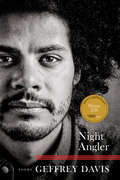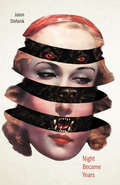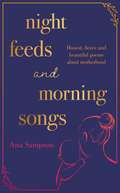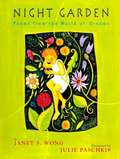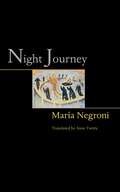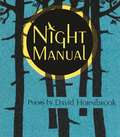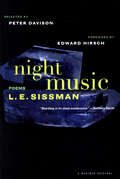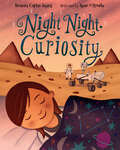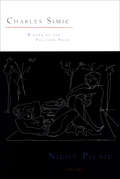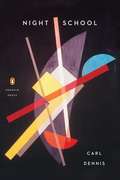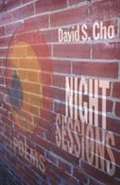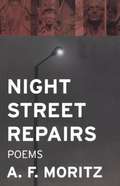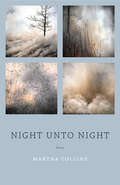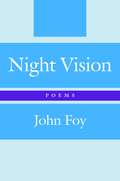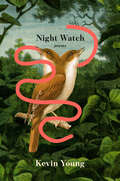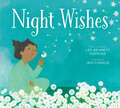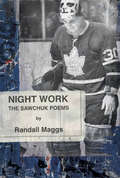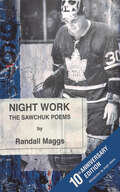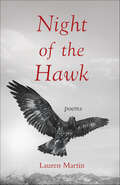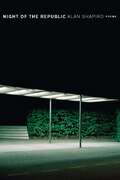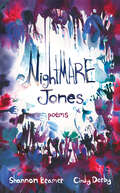- Table View
- List View
Nice Weather: Poems
by Frederick SeidelA stunning new collection from the "beguiling and magisterial" poet (The New York Times Book Review)"Something is going on. Something is wrong."Frederick Seidel-the "ghoul" (Chicago Review), the "triumphant outsider" (Contemporary Poetry Review)-returns with a dangerous new collection of poems. Nice Weather presents the sexual and political themes that have long preoccupied Seidel-and thrilled and offended his readers. Lyrical, grotesque, elegiac, this book adds new music and menace to his masterful body of work.
Nicole Brossard: Selections
by Nicole Brossard Jennifer MoxleyThis volume provides English-language readers with an overview of the life and work of Nicole Brossard, poet, novelist, and essayist, who is widely recognized in her native land and throughout the French-speaking world as one of the greatest writers of her generation.
Nietzsche's Horse
by Christopher Kennedy"A haunting, complex, and very beautiful book. Kennedy has a deep understanding of American longing and the inevitable losses associated with that longing and, because he is a powerful artist, is able to make from that loss a wonderful victory: this moving portrait of the human heart examining itself."--George Saunders, author of Pastoralia
Night & Ox
by Jordan ScottNight & Ox is a long poem working its interruptions to a degree where it's broken by the will to live. A poem that invokes expansive loneliness, where the poet's emotional response is to endure. A crushed line of astral forms and anatomy in perpetual remove; it is a poem that nurtures vulnerability: some soft-footed embryo sounds against language's viscera. Night & Ox possesses a feral minimalism for those too tired and too frantic with joy to cope with narrative. 'A fierce, ladderlike cri de cœur - at times a cri de cur - Night & Ox pulses with sawblade nocturnes that gnaw through the very rungs on which they're wrung. One part Jabberwocky-talkie, one part fatherhood ode, the poem seeks a threshold, where the "mondayescent" gives way to ardour, splendour, even love. Scott is a cosmoglot of the throat's ravine, and this is his manic, pandemonic article of faith.' - Andrew Zawacki
Night Angler (American Poets Continuum #172)
by Geffrey DavisWINNER OF THE 2018 JAMES LAUGHLIN AWARDGeffrey Davis’s second collection of poems reads as an evolving love letter and meditation on what it means to raise an American family. In poems that express a deep sense of gratitude and wonder, Davis delivers a heart-strong prayer that longs for home, for safety for Black lives, and for the messy success of breaking through the trauma of growing up during the crack epidemic to create a new model of fatherhood. Filled with humor and tenderness, Night Angler sings its own version of a song called grace—sung with a heavy and hopeful mix of inherited notes and discovered chords.
Night Became Years
by Jason StefanikNight Became Years is poetry in the sauntering tradition of the flâneur. Stefanik loafers his way over sacred geography and explores his own mixed heritage through the lexicon of Elizabethan canting language. Comparing the terminology of fifteenth-century English beggar vernacular with a contemporary Canadian inner-city worldview, the poems in Night Became Years unfold as separate entities while at the same time forming a larger narrative on the possibilities of poetry today and the nature of mixed-blood identity.
Night Feeds and Morning Songs: Honest, fierce and beautiful poems about motherhood
by Ana SampsonThe perfect gift for expectant mothers and new mums, whether it's her first baby or her fifth.'I read every single poem and wished that I'd had this book when I was pregnant, and feeding a baby, and watching her grow.' Sophie Heawood, author of The Hungover GamesA collection of honest, fierce and beautiful poems about being a mother, from pregnancy and birth to growing up and leaving home. Curated by acclaimed anthologist Ana Sampson, Night Feeds and Morning Songs examines motherhood from all angles, capturing the mess and the madness, to the joy and the wonder. Immerse yourself in classic verse from Carol Ann Duffy, Elizabeth Barrett Browning, Jackie Kay and Sylvia Path, to poems from bold new voices Kate Baer, Liz Berry, Nikita Gill and Imogen Russell Williams to name but a few.
Night Garden: Poems from the World of Dreams
by Janet S. WongA collection of poems describing a variety of dreams, some familiar, some strange, some beautiful, and some on the darker side.
Night Journey (The Lockert Library of Poetry in Translation #50)
by María NegroniOne of South America's most celebrated contemporary poets takes us on a fantastic voyage to mysterious lands and seas, into the psyche, and to the heart of the poem itself. Night Journey is the English-language debut of the work that won María Negroni an Argentine National Book Award. It is a book of dreams--dreams she renders with surreal beauty that recalls the work of her compatriot Alejandra Pizarnik, with the penetrating subtlety of Borges and Calvino. In sixty-two tightly woven prose poems, Negroni deftly infuses haunting imagery with an ironic, personal spirituality. Effortlessly she navigates the nameless subject to the slopes of the Himalayas, to a bar in Buenos Aires, through war, from icy Scandinavian landscapes to the tropics, across seas, toward a cemetery in the wake of Napoleon's hearse, by train, by taxis headed in unrequested directions, past mirrors and birds, between life and death. Night Journey reflects a mastery of a traditional form while brilliantly expressing a modern condition: the multicultural, multifaceted individual, ever in motion. Displacement abounds: a "medieval tabard" where a pelvis should be, a "lipless grin," a "beach severed from the ocean." In one poem "nomadic cities" whisk past. In another, smiling cockroaches loom in a visiting mother's eyes. Anne Twitty, whose elegant translations are accompanied by the Spanish originals, remarks in her preface that the book's "indomitable literary intelligence" subdues an unspoken terror--helplessness. Yet, as observed by the angel Gabriel, the consoling voice of wisdom, only by accepting the journey for what it is can one discover its "hidden splendor," the "invisible center of the poem." As readers of this magnificent work will discover, this is a journey that, because its every fleeting image conjures a thousand words of fertile silence, can be savored again and again.
Night Manual (Made in Michigan Writers Series)
by David HornibrookNight Manual is a survival guide for life—all the messy, wonderful, grieving, and self-doubting parts of life. David Hornibrook’s debut poetry collection is a book of hours that keeps time through anguish and explores the ineffable borderland of existence. These are poems that seek to get at what cannot be described through a process of negation—to delineate the shape of an absence by writing the things around it. Night Manual is divided into four sections loosely inspired by the four seasons. Each section explores the theme of absence from a slightly different proximity; as a whole, the book progresses from grief to gratitude. A major task of Hornibrook’s is to communicate the gravity and perplexity of loss while at the same time charting out a kind of liturgy of joy and wonder at the cycle of life in an ever-changing world. With lines like "My eyes are pulled to the monitor / where a universe expands or contracts, I can’t tell which" (from "The Ultrasound") to "Facebook keeps showing Miley with her mouth open / & I keep finding little things wrong with everything" (from "Self Portrait w/ Wrecking Ball"), Hornibrook has created instructions for moving through a world suddenly disoriented by loss, a world with starlings, water birds and aliens, robots and deer, Miley Cyrus and God, black holes, and the quiet morning strangeness of a house when all the people you love are still asleep. Fans of contemporary poetry who want to believe in something again—who need a small dose of absurdity along with their suffering—this collection is for you.
Night Music: Poems
by L. E. SissmanSelected by Peter Davison with an introduction by Edward Hirsch. Sissman was a true phenomenon in American poetry. He published his first book, a collection of antic, autobiographical episodes in blank verse, in 1968. Eight years and three books later, he died of Hodgkin's disease at the age of forty-eight. Of Sissman's remarkable final poems John Updike wrote, "What other poet had ever given such wry and unblinking witness to his own dying? His poetry gave back to life more generously than he had received, and carried his beautiful wit into darkness undimmed." Now Sissman's longtime editor, Peter Davison, has selected from his lifework the essential poems--the essence of an American original. (A Mariner Original)
Night Night, Curiosity
by Brianna Caplan SayresWhile Mom works the night shift at NASA, Dad helps an intrepid girl get ready for sleep as she imagines she's exploring Mars.In this rhyming bedtime book, a girl whose mother works at NASA imagines that she's exploring Mars with the Curiosity rover as she gets ready for bed. She describes taking off, observing Mars, communicating with mission control, and operating the rover. Young space explorers everywhere will want to head for Mars, too!
Night Picnic: Poems
by Charles SimicThe Pulitzer Prize–winning poet “illuminates the shadow side of life in poems as perfectly formed and directed as the beam of a flashlight” (Booklist).The poems in Charles Simic’s new collection evoke a variety of settings and images, from New York City to small New England towns; from crowds spilling onto the sidewalk on a hot summer night to an abandoned wooden church and a car graveyard overgrown with weeds. His subjects range from a bakery early in the morning to the fingerprints on a stranger’s front door; from waiters in an empty restaurant to the decorations in a window of a funeral home; from a dog tied to a chain to a homeless man sleeping at the foot of a skyscraper; and other moments of solitude and clear vision.“What is beautiful,’ he writes in one poem, “is found accidentally and not sought after. What is beautiful is easily lost.” Simic is the metaphysician of the ordinary, a poet who reminds us of the mysteries of our daily lives.“This first book of poems since 1999’s Jackstraws continues Simic’s familiar, unsettling methods and extends them into the terrain of older age . . . Simic remains a powerful, and funny, chronicler of an individual world one where pastry, omelets and queen-size beds offer their ambiguous pleasures, and where, inseparably, ‘the butchery of the innocent/ Never stops.’ It is a world that should be familiar.” —Publishers Weekly“Nabokovian in his caustic charm and sexy intelligence, Simic perceives the mythic in the mundane and pinpoints the perpetual suffering that infuses human life with both agony and bliss.” —Booklist
Night School (Penguin Poets)
by Carl DennisA masterful new collection of poetry from the winner of the Pulitzer Prize and the Ruth Lilly Prize The poems in Carl Dennis’s thirteenth collection, Night School, are informed by an engagement with a world not fully accessible to the light of day, a world that can only be known with help from the imagination, whether we focus on ourselves, on people close at hand, or on the larger society. Only if we imagine alternatives to our present selves, Dennis suggests, can we begin to grasp who we are. Only if we imagine what is hidden from us about the lives of others can those lives begin to seem whole. Only if we can conceive of a social world different from the one we seem to inhabit can we begin to make sense of the country we call our own. To read these poems is to find ourselves invited into a dialogue between what is present and what is absent that proves surprising and enlarging.
Night Sessions
by David S. ChoThe collection presents snapshots of the Korean American experience through poems ranging from the hardships of first generation Korean immigrants, their blue-collar work (though many had professional degrees), and arduous immigration to the United States to the rise of the second and even third generation, of culturally Americanized youth attempting to reconcile their bi-cultural heritage.
Night Street Repairs
by A.F. MoritzTo read A.F. Moritz is to find out what it means to be alive at this juncture of history. These poems are mansions, both derelict and opulent. Wander in with the mind open and hear what the ages, humanity, and the myth of progress have wrought. Night Street Repairs contains necessary meditations on time, modernity, and our current situation as a society of appetite flirting with self-destruction. Many voices act as vigilant witness to our urban wastes and wastefulness.Moritz's unmistakable cadences -- magisterial, philosophical, and funny -- mingle among the ancients, the Bible, Leopardi, Montale, and Rilke as he extends his already prestigious and singular poetic project.
Night Unto Night: Poems
by Martha Collins“In this luminous companion to Day unto Day” the acclaimed poet seeks to reconcile beauty and horror, joy and mortality, the personal and the political (Publishers Weekly, starred review).Like its predecessor, Day unto Day, this new collection presents six sequences, each written in one month a year, over the course of six years. It brings together the natural and the all-too-human; red-winged blackbirds and the death of a friend; the green leaves of a maple tree and drones overseas; a February spent in Italy and the persistence of anti-immigrant rhetoric.Dissonance is a permanent state, Collins suggests, something to be occupied rather than solved. And so this collection lives in the space between these seeming contrasts—and in the space between stanzas, sequences, days, and months. These poems speak to and revisit each other, borrowing a word or a line before turning it on end.
Night Vision: Poems
by John FoyIn John Foy's Night Vision, wars go on in the Middle East, violence is never far away, and the creatures of the field are much the worse / for having been beneath the rotor blades. Written in an uncluttered idiom, these poems, technically adept, play across a range of forms in a voice that stands out for its bitter clarity and directness.
Night Watch: Poems
by Kevin YoungFrom the award-winning poet at the height of his career, a book of personal and American experiences, both beautiful and troubling, touching on the generative cycle of loss and renewalFollowing on his exquisite Stones, Kevin Young&’s new collection, written over the span of sixteen years, shapes stories of loss and legacy, inspired in part by other lives. After starting in the bayous of his family's Louisiana, Young journeys to further states of mind in &“All Souls,&” evoking &“The whale / who finds the shore / & our poor prayers.&” Another central sequence, &“The Two-Headed Nightingale,&” is spoken by Millie-Christine McCoy, the famous conjoined African American &“Carolina Twins.&” Born into enslavement, stolen, and then displayed by P. T. Barnum and others, the twins later toured the world as free women, their alto and soprano voices harmonizing their own way. Young&’s poem explores their evolving philosophical selfhood and pluralities: &“As one we sang, /we spake— / She was the body / I the soul / Without one / Perishes the whole.&” In &“Darkling,&” a cycle of poems inspired by Dante&’s Divine Comedy, Young expands and embroiders the circles of Hell, drawing a cosmology of both loneliness and accompaniment, where &“the dead don&’t know / what to do / with themselves.&” Young writes of grief and hope as familiar yet surprising states: &“It&’s like a language, / loss—,&” he writes, &“learnt only / by living—there—.&” Evoking the history of poetry, from the darkling thrush to the darkling plain, Young is defiant and playful on the way through purgatory to a kind of paradise. When he goes, he warns, &“don't dare sing Amazing Grace&”—that &“National / Anthem of Suffering.&” Instead, he suggests, &“When I Fly Away, / Don't dare hold no vigil . . . Just burn the whole / Town on down.&” This collection will stand as one of Young&’s best—his voice shaping sorrow with music, wisdom, heartache, and wit.
Night Wishes
by Jen CoraceHow would a clock, nightlight, or teddy bear say good night? In this enchanting poetry collection, Lee Bennett Hopkins and thirteen other poets imagine the wishes whispering through a young girl&’s bedroom as she falls asleep. The bookshelf&’s stories curl through her head; the pillow transforms into a hot air balloon; the rocking horse waits expectantly for tomorrow&’s adventures. Stunning gouache illustrations by Jen Corace offer new details to discover with every reading. Perfect for bedtime reading and re-reading, Night Wishes will transport young readers into a wonderful, whimsical world of dreams. Includes poems by…Rebecca Kai DotlichMatt Forrest EsenwineJude MandellPrince RedcloudAlice SchertleJoyce SidmanEileen SpinelliIrene LathamLee Bennett HopkinsNikki GrimesDeborah RuddellDarren SardelliRenee LaTulippe
Night Work: The Sawchuk Poems
by Randall MaggsWinner of the 2008 Winterset Award and the 2009 E.J. Pratt Poetry Prize Winner of the Kobzar Literary Award 2010 A hockey saga, wrapping the game’s story in the “intense, moody, contradictory” character of Terry Sawchuk, one of its greatest goalies. In compact, conversational poems that build into a narrative long poem, Night Work: The Sawchuk Poems follows the tragic trajectory of the life and work of Terry Sawchuk, dark driven genius of a goalie who survived twenty tough seasons in an era of inadequate upper-body equipment and no player representation. But no summary touches the searching intensity of Maggs’s poems. They range from meditations on ancient/modern heroism to dramatic capsules of actual games, in which the mystery of character meets the mystery of transcendent physical performance. Night Work: The Sawchuk Poems is illustrated with photographs mirroring the text, depicting key moments in the career of Terry Sawchuk, his exploits and his agony.
Night Work: The Sawchuk Poems - 10th Anniversary Edition
by Randall MaggsA new edition of a hockey saga, wrapping the game's story in the "intense, moody, contradictory" character of Terry Sawchuk, one of its greatest goalies. Denied the leap and dash up the ice, what goalies know is side to side, an inwardness of monk and cell. They scrape. They sweep. Their eyes are elsewhere as they contemplate their narrow place. Like saints, they pray for nothing, which brings grace. Off-days, what they want is space. They sit apart in bars. They know the length of streets in twenty cities. But it's their saving sense of irony that further isolates them as it saves. - from "One of You" In compact, conversational poems, Night Work: The Sawchuk Poems follows the tragic trajectory of the life and work of Terry Sawchuk, dark driven genius of a goalie who survived twenty tough seasons in an era of inadequate upper-body equipment and no player representation. But no summary touches the searching intensity of Maggs's poems. They range from meditations on ancient/modern heroism to dramatic capsules of actual games, in which the mystery of character meets the mystery of transcendent physical performance. Night Work: The Sawchuk Poems is illustrated with photographs mirroring the text, depicting key moments in the career of Terry Sawchuk, his exploits and his agony. This 10th anniversary edition of the book marks both the 50th anniversary of the last time the Leafs won the Stanley Cup and the 100th anniversary of the Leafs as a team. With rich reflections on the book by novelist Angie Abdou and Hockey Night in Canada host Ron MacLean, as well as excerpts from scores of reviews by the likes of Gord Downie and Dave Bidini, this new edition of Night Work is a must-have for lovers of hockey and poetry alike.
Night of the Hawk: Poems
by Lauren MartinWhen I have wandered long enough what am I still beholden to?Ifá. Nature. Illness. Love. Loss. Misogyny. Aging. Africa. Our wounded planet. In this sweeping yet intensely personal collection, Lauren Martin tells the untold stories of the marginalized, the abused, the ill, the disabled—the different. Inspired by her life’s experiences, including the isolation she has suffered as a result both of living with chronic illness and having devoted herself to a religion outside the mainstream, these poems explore with raw vulnerability and unflinching honesty what it is to live apart—even as one yearns for connection.But Night of the Hawk is no lament; it is powerful, reverential, sometimes humorous, often defiant—“Oh heat me and fill me / I rise above lines”—and full of wisdom. Visceral and stirring, the poems in this collection touch on vastly disparate subjects but are ultimately unified in a singular quest: to inspire those who read them toward kindness, compassion, and questioning.
Night of the Republic: Poems
by Alan ShapiroPoetry about places—from a supermarket to a strip club to a suburban home—from a poet who &“seeks what lies at the deepest level of the human heart&” (Chicago Tribune). In Night of the Republic, Alan Shapiro takes us on an unsettling night tour of America&’s public places—a gas station restroom, shoe store, convention hall, and race track, among others—and in stark Edward Hopper–like imagery reveals the surreal and dreamlike features of these familiar but empty night spaces. Shapiro finds in them not the expected alienation but rather an odd, companionable solitude rising up from the quiet emptiness. In other poems, Shapiro writes movingly of his 1950s and &’60s childhood in Brookline, Massachusetts, with special focus on the house he grew up in. These meditations, always inflected with Shapiro&’s quick wit and humor, lead to recollections of tragic and haunting events such as the Cuban missile crisis and the assassination of JFK. While Night of the Republic is Shapiro&’s most ambitious work to date, it is also his most timely and urgent for the acute way it illuminates the mingling of private obsessions with public space. &“His poems are both artful and unpretentious.&” —Boston Review
Nightmare Jones: poems
by Shannon BramerA collection of jaunty and mischievously unsettling poems for middle-grade readers from award-winning poet Shannon Bramer and artist Cindy Derby, who brought us Climbing Shadows (NCTE Notable Poetry Book and Verse Novel, shortlisted for the Rocky Mountain Book Award). Shannon’s twenty-eight poems in Nightmare Jones send delightful shivers down the spine. Written in a variety of styles and forms, they encompass magic realism and influences from fairy tales, folklore and ghost stories, alongside more contemporary explorations of unusual creatures, misunderstood monsters and commonplace human fears (both ridiculous and sublime!). Cindy Derby’s evocative line and watercolor illustrations inhabit these weird and wonderful works with her characteristic flair for the strange and witchy wonders of the world. In these poems what makes a person scared might also make them sad, or even make them laugh, as Bramer writes from a place of wonder, empathy, curiosity and reverence for the deep dark woods we all have inside us. If you’ve ever wanted to spend some time in a witch’s garden or wondered what spiders do with our worries, this is the poetry book for you! Key Text Features dialogue epigraph illustrations poems recipes table of contents vignettes Correlates to the Common Core State Standards in English Language Arts: CCSS.ELA-LITERACY.RL.5.2 Determine a theme of a story, drama, or poem from details in the text, including how characters in a story or drama respond to challenges or how the speaker in a poem reflects upon a topic; summarize the text. CCSS.ELA-LITERACY.RL.6.4 Determine the meaning of words and phrases as they are used in a text, including figurative and connotative meanings; analyze the impact of a specific word choice on meaning and tone
